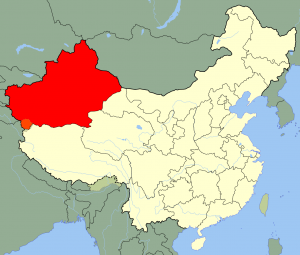 SECURITY
SECURITY
 SECURITY
SECURITY
 SECURITY
SECURITY
Chinese border guards are allegedly installing spyware on the phones of people who enter some land borders in the country’s far west, according to reports from Motherboard and others today.
The spyware in question, going by the names of BXAQ or Fengcai, is said to be part of an app being installed on Android phones by border guards called CellHunter or MobileHunter.
Once installed, the spyware scrapes calendar entries, text messages, phone contacts and call logs, sending all the data to a remote server. The spyware also scans for more than 73,000 files primarily relating to Islamic extremist groups but also sections of the Quran, portions of an Arabic dictionary and even any photos of the Dali Lama. Bizarrely, the spyware also scans for a song by Japanese band Unholy Grace that refers to Taiwan.
 The spyware is only being installed at some border crossings between Kyrgyzstan and the Xinjiang Uygur Autonomous Region, China’s largest province or region by size and is also one of the country’s most remote. The region shares borders with eight countries and reflects its central Asian neighbors to the west in that the local people are Muslim with 45% being Uyghur, a Turkic ethnic group.
The spyware is only being installed at some border crossings between Kyrgyzstan and the Xinjiang Uygur Autonomous Region, China’s largest province or region by size and is also one of the country’s most remote. The region shares borders with eight countries and reflects its central Asian neighbors to the west in that the local people are Muslim with 45% being Uyghur, a Turkic ethnic group.
Trouble in the region stems back to the rise of the East Turkestan independence movement in the 1980s. Subsequent terrorist attacks not only in Xinjiang but in other parts of China as well have been perpetrated by those aligned with the movement. Indeed, the vast majority of the 27 major terrorist attacks in China since 1992 are attributed to Xinjiang separatists.
In response to the ongoing attacks, China started cracking down on the Muslim Uyghur citizens in Xinjiang in 2014, detaining a significant number of them in re-education camps aimed at changing the political and religious beliefs of those detained.
The Chinese government justifies the re-education camps as necessary to maintain peace in the region, while those in the West condemn them as concentration camps.
As part of a broader surveillance state and the crackdown on dissent in Xinjiang, the installation of spyware onto the phones of visitors into the region isn’t greatly surprising.
“We already know that Xinjiang residents, particularly Turkic Muslims, are subjected to round-the-clock and multidimensional surveillance,” Maya Wang, China senior researcher at Human Rights Watch, told Motherboard. “[This malware] suggests that even foreigners are subjected to such mass and unlawful surveillance.”
China is also in the process of rolling out its Social Credit System, a system compared to Big Brother in that it tracks the activities of all citizens and ranks them on their behaviors. Those with lower social credit scores lose privileges and can even be banned from using forms of transport or from traveling.
THANK YOU